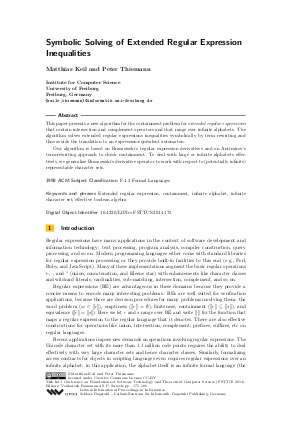Symbolic Solving of Extended Regular Expression Inequalities
Authors Matthias Keil, Peter Thiemann
-
Part of:
Volume:
34th International Conference on Foundation of Software Technology and Theoretical Computer Science (FSTTCS 2014)
Part of: Series: Leibniz International Proceedings in Informatics (LIPIcs)
Part of: Conference: IARCS Annual Conference on Foundations of Software Technology and Theoretical Computer Science (FSTTCS) - License:
 Creative Commons Attribution 3.0 Unported license
Creative Commons Attribution 3.0 Unported license
- Publication Date: 2014-12-12
File

PDF
LIPIcs.FSTTCS.2014.175.pdf
- Filesize: 449 kB
- 12 pages
Document Identifiers
Subject Classification
Keywords
- Extended regular expression
- containment
- infinite alphabet
- infinite character set
- effective boolean algebra
Metrics
- Access Statistics
-
Total Accesses (updated on a weekly basis)
0Document
0Metadata
Abstract
This paper presents a new algorithm for the containment problem for extended regular expressions that contain intersection and complement operators and that range over infinite alphabets. The algorithm solves extended regular expressions inequalities symbolically by term rewriting and thus avoids the translation to an expression-equivalent automaton. Our algorithm is based on Brzozowski's regular expression derivatives and on Antimirov's term-rewriting approach to check containment. To deal with large or infinite alphabets effectively, we generalize Brzozowski's derivative operator to work with respect to (potentially infinite) representable character sets.
Cite As Get BibTex
Matthias Keil and Peter Thiemann. Symbolic Solving of Extended Regular Expression Inequalities. In 34th International Conference on Foundation of Software Technology and Theoretical Computer Science (FSTTCS 2014). Leibniz International Proceedings in Informatics (LIPIcs), Volume 29, pp. 175-186, Schloss Dagstuhl – Leibniz-Zentrum für Informatik (2014)
https://doi.org/10.4230/LIPIcs.FSTTCS.2014.175
BibTex
@InProceedings{keil_et_al:LIPIcs.FSTTCS.2014.175,
author = {Keil, Matthias and Thiemann, Peter},
title = {{Symbolic Solving of Extended Regular Expression Inequalities}},
booktitle = {34th International Conference on Foundation of Software Technology and Theoretical Computer Science (FSTTCS 2014)},
pages = {175--186},
series = {Leibniz International Proceedings in Informatics (LIPIcs)},
ISBN = {978-3-939897-77-4},
ISSN = {1868-8969},
year = {2014},
volume = {29},
editor = {Raman, Venkatesh and Suresh, S. P.},
publisher = {Schloss Dagstuhl -- Leibniz-Zentrum f{\"u}r Informatik},
address = {Dagstuhl, Germany},
URL = {https://drops.dagstuhl.de/entities/document/10.4230/LIPIcs.FSTTCS.2014.175},
URN = {urn:nbn:de:0030-drops-48411},
doi = {10.4230/LIPIcs.FSTTCS.2014.175},
annote = {Keywords: Extended regular expression, containment, infinite alphabet, infinite character set, effective boolean algebra}
}
Author Details
References
-
Valentin M. Antimirov. Rewriting regular inequalities. In Horst Reichel, editor, FCT, volume 965 of LNCS, pages 116-125. Springer, 1995.

-
Valentin M. Antimirov. Partial derivatives of regular expressions and finite automaton constructions. Theoretical Computer Science, 155(2):291-319, 1996.

-
Filippo Bonchi and Damien Pous. Checking NFA equivalence with bisimulations up to congruence. In Roberto Giacobazzi and Radhia Cousot, editors, POPL, pages 457-468, Rome, Italy, January 2013. ACM.

-
Janusz A. Brzozowski. Derivatives of regular expressions. J. ACM, 11(4):481-494, 1964.

-
Pascal Caron, Jean-Marc Champarnaud, and Ludovic Mignot. Partial derivatives of an extended regular expression. In Adrian Horia Dediu, Shunsuke Inenaga, and Carlos Martín-Vide, editors, LATA, volume 6638 of LNCS, pages 179-191. Springer, 2011.

-
A. Ginzburg. A procedure for checking equality of regular expressions. J. ACM, 14(2):355-362, April 1967.

-
Victor M. Glushkov. The abstract theory of automata. Russian Mathematical Surveys, 16(5):1-53, 1961.

-
Phillip Heidegger, Annette Bieniusa, and Peter Thiemann. Access permission contracts for scripting languages. In John Field and Michael Hicks, editors, Proc. 39th ACM Symp. POPL, pages 111-122, Philadelphia, USA, January 2012. ACM Press.

-
John Edward Hopcroft and Richard Manning Karp. A linear algorithm for testing equivalence of finite automata. Technical report, Cornell University, 1971.

-
Harry B. Hunt III, Daniel J. Rosenkrantz, and Thomas G. Szymanski. On the equivalence, containment, and covering problems for the regular and context-free languages. J. Comput. Syst. Sci., 12(2):222-268, 1976.

-
Tao Jiang and Bala Ravikumar. Minimal NFA problems are hard. SIAM J. Comput., 22(6):1117-1141, 1993.

-
Matthias Keil and Peter Thiemann. Efficient dynamic access analysis using JavaScript proxies. In Proceedings of the 9th Symposium on Dynamic Languages, DLS'13, pages 49-60, New York, NY, USA, 2013. ACM.

-
Matthias Keil and Peter Thiemann. Symbolic solving of regular expression inequalities. Technical report, Institute for Computer Science, University of Freiburg, 2014.

-
Robert McNaughton and Hisao Yamada. Regular expressions and state graphs for automata. Electronic Computers, IRE Transactions on, EC-9(1):39-47, 1960.

-
Albert R. Meyer and Larry J. Stockmeyer. The equivalence problem for regular expressions with squaring requires exponential space. In SWAT (FOCS), pages 125-129. IEEE Computer Society, 1972.

-
Scott Owens, John H. Reppy, and Aaron Turon. Regular-expression derivatives re-examined. J. Funct. Program., 19(2):173-190, 2009.

-
Valentin N. Redko. On defining relations for the algebra of regular events. Ukrain. Mat., 16:120-126, 1964.

-
Ken Thompson. Regular expression search algorithm. Commun. ACM, 11(6):419-422, 1968.

-
Gertjan van Noord and Dale Gerdemann. Finite state transducers with predicates and identities. Grammars, 4(3):263-286, 2001.

-
Margus Veanes. Applications of symbolic finite automata. In Stavros Konstantinidis, editor, CIAA, volume 7982 of Lecture Notes in Computer Science, pages 16-23, Halifax, NS, Canada, 2013. Springer.

-
Bruce W. Watson. Implementing and using finite automata toolkits. Nat. Lang. Eng., 2(4):295-302, December 1996.

